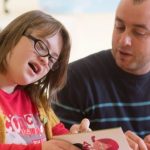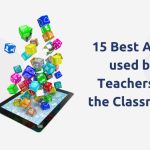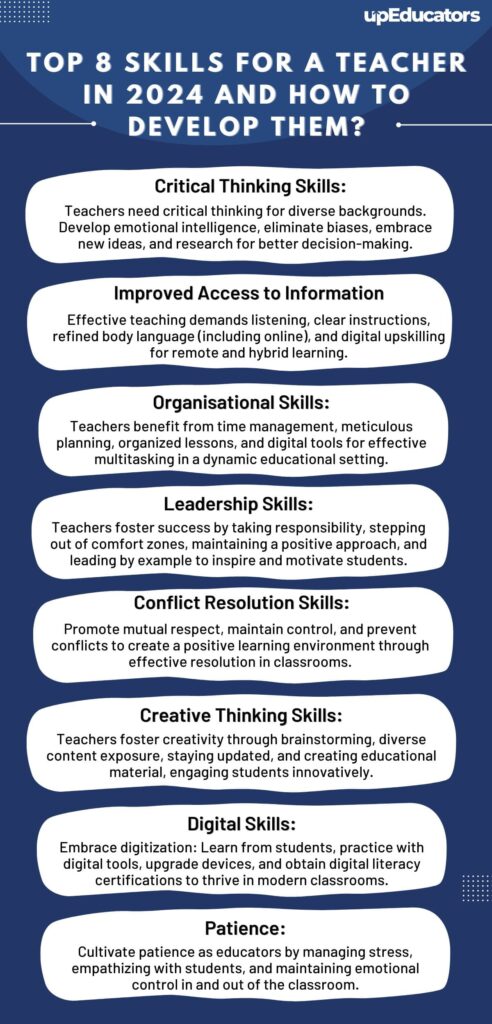 When Physics was introduced as a discipline to a new batch of students, more than 50% of the class was unable to comprehend the basic concepts of acceleration and displacement. Despite the teacher having access to smart teaching tools and textbooks, the students were unable to understand the basic concepts of physics.
When Physics was introduced as a discipline to a new batch of students, more than 50% of the class was unable to comprehend the basic concepts of acceleration and displacement. Despite the teacher having access to smart teaching tools and textbooks, the students were unable to understand the basic concepts of physics.
A different teacher was assigned to this group of students and with the help of digital tools and study materials, she made Physics an interesting and approachable discipline for these students.
Teaching seems like an easy job for Non-Teachers. Anybody can acquire degrees and medals but the skills and ability to connect and align with the mindsets of students is not everyone’s cup of tea. Becoming a good teacher requires the development of certain soft and hard skills. Certain virtues like patience and kindness are part of an individual’s personality but even these skills can be developed with persistence and hard work.
In a recent article by Indeed.com, one can find the various skill sets and traits that are considered essential for teachers to possess in 2022. Indeed is one of the best global platforms for finding employment vacancies and various job openings in all fields.
Let us look at some of the skills that a future Educator or Teacher needs and find out ways to develop them.
- Critical Thinking Skills
Teachers in today’s dynamic environment need to develop critical thinking skills. A teacher has to deal with students from different backgrounds. In addition to this, the job of an educator involves meeting goals and solving problems for their students as well as the organization. Critical thinking skills would help an educator to think rationally and make better objective decisions and come to unbiased solutions.
How to Develop Critical Thinking Skills?
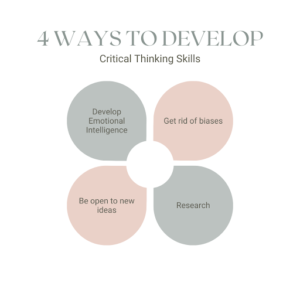
- Develop Emotional Intelligence:
Emotional intelligence is the awareness of your own emotions and the emotions of those around you.
Teachers need to develop emotional intelligence to think critically. For instance, a teacher came to a morning class in a bad mood due to some personal issues and found a couple of students complaining about the low grades on a test. Instead of getting angry with students, she empathized with their problems and addressed them. - Get rid of biases:
We all have some biases and we use our prejudiced perspectives to solve problems. One should try to think from the other person’s perspective in order to make decisions and solve problems objectively. For instance, you can think from the perspective of a student in a situation and then take better decisions or form opinions. - Be open to new ideas:
A human being can only think critically when he is open to new ideas and is ready to change his/her beliefs when projected to novel and different ideas or opinions. - Research:
In order to think critically, one must have complete knowledge of the point in the discussion. You must do thorough research and then form opinions or solve problems.
- Communication Skills
A teacher needs to be a good communicator in order to convey the lessons and teach better in class. All good communicators might not be teachers but all teachers need to be good communicators. Developing communication skills is not limited to speaking as it involves writing and verbal communication along with good listening skills. Furthermore, teaching is shifting to remote and hybrid models of learning and thus teachers in the 21st century need to be equipped with the skills to use digital tools to communicate.
How to Develop Communication Skills?
- Listen:
The first step to developing communication skills is to become a good listener. Listen intently to what your students have to convey and then you would be able to understand them and teach them efficiently. - Keep it simple:
Avoid using complex instructions and try to be clear and concise with what you have to say. Even while teaching a lesson, you must keep your sentences clear, concise and free of complexities to make students learn better. - Work on body language:
Body language is an important part of verbal communication in the classroom. Affirmative body language can make students more engaged in the classroom. Body language is also crucial to teach through digital platforms. - Upskilling:
In a digitally saturated education system, teachers in the 21st century need to develop digital skills. In addition to developing digital skills, you get yourself certified in digital skills too.
- Organisational Skills
A teacher’s job includes taking multiple classes and working for the administration of the institute or even looking over co-curricular activities. A person involved in multi-tasking on a day-to-day basis must be good at organisational skills.
How to Develop Organisational Skills?
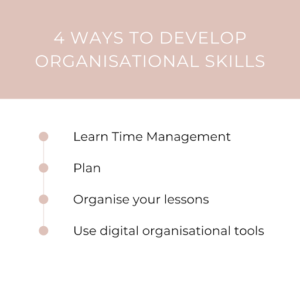
- Learn Time Management:
As an educator, you must know how to manage your time and divide it wisely for different activities. You can use digital applications like Rescue Time and Focus Keeper to keep track of your daily hours and how you are spending them. Some of these applications use the Pomodoro technique to help you in completing important tasks on time. - Plan:
Good organisation begins with proper planning. You can take some time out every Sunday and make a plan for the week and achieve your goals as you work through the week. - Organise your lessons: You can either use digital tools or use physical binders to organise all the material you have collected to teach in the classroom. Keep this collected material organised in a uniform manner. Use colour coding or other methods to make it more accessible.
- Leadership Skills:
Teachers are like the leaders of the class and without effective leadership skills, students won’t follow and listen to their mentor/teacher. In addition to this, teachers need leadership skills to inspire and motivate the classroom towards success.
How to Develop Leadership Skills?
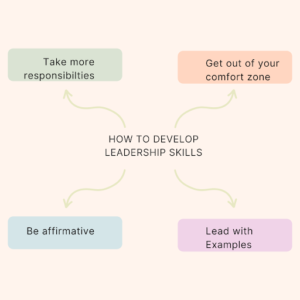
- Take More Responsibility:
A true leader is one who takes on more responsibilities than he is assigned. Try to develop leadership skills by helping your students. For instance, you can use your free time to narrate inspiring stories to students or help them in brushing their skills. - Get out of your comfort zone:
Say yes to hosting an event for students even if you have never done that before. A leader develops his/her soft and hard skills by getting out of his comfort zone every time an opportunity arises in front of him/her. - Be Affirmative:
A person who has a negative attitude can’t become a successful leader. An educator needs to be affirmative in his/her speech and action to lead a classroom full of young minds.
Use positive words, body language and feedback techniques to lead your students in the classroom and become role models for them. - Lead with Example:
Practice what you preach. If a student observes that a teacher’s actions do not match his/her words, then the student will be reluctant to follow your example. If you want students to read in their free time, then you must also read in your free time in front of them.
- Conflict Resolution Skills
Conflicts are a part of every organisation or a place where two or more individuals are involved. A classroom is a hotbed of conflicts with young children and teenagers always getting into arguments and fights. A teacher needs to develop conflict resolution skills to be able to de-escalate such situations inside and outside the classroom.
How to Develop Conflict Resolution Skills?
- Promote Mutual Respect:
Students in a classroom must learn to develop mutual respect. Teachers can conduct exercises like playing games that build team spirit to help students develop mutual trust and respect. - Be in Control:
Teachers must be in more control over the classroom and avoid any kind of discussion from turning into a conflict or a verbal argument. You should always lead and control the classroom to be able to control conflicts before they arise.
- Creative Thinking Skills
Teachers in the 21st century lead classrooms filled with students who are exposed to innovative and creative content and ideas every day. Teachers need to develop creative thinking skills to be able to lead creative students. Creativity is considered a gift but creative thinking abilities and skills can be developed with practice and perseverance.
How to Develop Creative Thinking Skills?
- Brainstorming:
Brainstorming to solve problems and find new and creative solutions to old problems is the most ideal way to develop creative thinking skills. Hold brainstorming sessions in the classroom and take part in them to develop this crucial skill set. - Consume Different Content:
It is essential to expose your mind to new ideas to develop creative thinking abilities. Do not restrict yourself to one form of content. Start reading online teaching blogs along with your morning newspaper. - Stay Updated:
The trend and methods to teach are changing every day. In order to brush up on your creative skills, you need to stay updated and follow the latest trends. - Create:
The only way to develop creative skills is to actually create something. You can develop your creative skills by creating something for your students. Try to make a creative chart to help them understand a technical concept or get involved in the classroom by participating with the students in making a project or an assignment.
- Digital Skills
The classrooms in 2022 are heavily digitised. Institutes make use of smart learning tools in the classroom and remote learning is completely based on the digital world. In such a situation, a teacher needs to be teach-savvy to fit into the modern education system.
How To Develop Digital Skills?
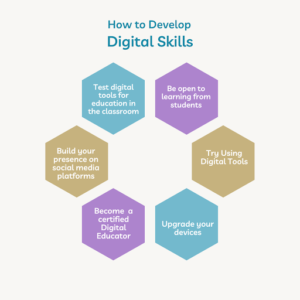
- Be open to learning from students:
The younger generation is more skilled in using tools. So if a student in your class volunteers to familiarise you with digital tools, then you must not be reluctant to learn from them. - Try Using Digital tools:
The best way to gain digital literacy is to practice using these tools. Try your hands on various digital tools and if you face any problems, you can always use platforms like YouTube to find solutions to move forward. - Upgrade your devices:
A lot of people are reluctant to update their smart devices and use obsolete technology. As an educator, you need to use the latest technologies and devices to become digitally literate. - Become a Certified Digital Educator:
Digital skills are essential to survive in the modern world of education. Teachers or educators can get a certification in digital skills. There are a lot of certified digital courses available for Educators.
- Patience
Patience is a personality trait in a lot of individuals but as a skill set, it can be developed with practice. Teachers have to go through everyday situations both inside and outside the classroom that require them to be patient. From communicating with difficult parents to conflict resolution in the classroom, teachers need to be very patient in every step.
How to Develop Patience?
- Manage stress: Stress is one of the major causes of impatience. A teacher must learn to cope with stress in order to stay patient in every situation. Practice mindfulness or therapeutic activities like Yoga and meditation to battle stress. Avoid burnout to manage stress from working in the classrooms.
- Be an Empath: People who are patient are those who are empaths and understand the perspective of other people. Put yourself in your students’ shoes and you will be more patient in dealing with them.
- Be in control of your emotions: People lose control of their emotions and react unreasonably in certain situations. As an educator, you must develop emotional intelligence and stay in control of your emotions to stay patient.
Teachers in the 21st century can’t survive solely on the basis of their mastery of a subject. Teachers need to have a dynamic set of skills that could enhance their experiences with modern pedagogy and modes of education. In order to teach modern students, the teachers need to be adaptable and flexible toward the modern methods of learning and develop the required skill sets.
Author: This article is written by Samiya Rashid for upEducators blog.

